|



|
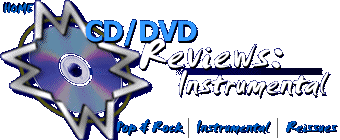
For audio
samples you'll
need the RealPlayer

|
NOVEMBER /
DECEMBER 2004

|
| |
|
|
| |

LEO
KOTTKE
|

HAPPY
THE MAN
|

THE
FRANK AND JOE SHOW |

THE
SUPERTONES |
|

RICHARD LEO JOHNSON
|
|
| |
|
|
| |
LEO KOTTKE
Try And Stop Me
(Bluebird / RCA Victor)
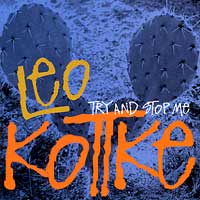 Acoustic
guitar legend Leo Kottke released Try And Stop Me in 2004 as
the follow up CD to his 2002 release with Mike Gordon of Phish entitled
Clone. While Clone featured a range of vocal tracks, Try
And Stop Me gets Kottke back to doing what he does best which is
making hypnotic, rural guitar instrumentals that evoke the spirits of
his mentor John Fahey. Recorded near Kottke’s home in Minneapolis,
the 11 track CD finds Kottke riffing out a six and 12 string guitar
adding in more than a touch of improvisation. Kottke adds, “Over
time, the importance of improvisation for me has increased”, adding
“Clone raised the level of risk I was willing to accept.”
Kottke’s strength as a guitar instrumentalist over the years was
always his unique ability to blend folk, pop, jazz and classical guitar
styles as his own and in typical fashion, Kottke rounds out Try And
Stop Me with an instrumental version of the Patti Page ‘50s
pop standard “Mockingbird Hill.” The CD’s lone vocal
finds Kottke reinterpreting a folk classic with Kottke adding, “It
was folk singing legend Pete Seeger’s recording of ‘The Banks
Of Marble’ that first got me excited about the 12-string guitar
many years ago.” Over the years, Kottke has earned the respect
of guitar contemporaries such as John Fahey, Paco de Lucia, John Williams
and Joe Pass to which the guitarist adds, “My music is maybe hard
to categorize. It doesn’t fit conveniently into the bins at record
stores. I don’t rise and fall with trends. It’s been great
that way.” While classic Kottke albums—from Chewing Pine
in 1975 to his 1999 album One Guitar, No Vocals—are considered
classics, his 1969 breakthrough album on Takoma Records, Six And
12 String Guitar is also highly regarded. Long time Kottke watchers
will want to check out a 2004 hybrid stereo / SACD version of the album
on Takoma / Fantasy. www.leokottke.com
/ www.fantasyjazz.com Acoustic
guitar legend Leo Kottke released Try And Stop Me in 2004 as
the follow up CD to his 2002 release with Mike Gordon of Phish entitled
Clone. While Clone featured a range of vocal tracks, Try
And Stop Me gets Kottke back to doing what he does best which is
making hypnotic, rural guitar instrumentals that evoke the spirits of
his mentor John Fahey. Recorded near Kottke’s home in Minneapolis,
the 11 track CD finds Kottke riffing out a six and 12 string guitar
adding in more than a touch of improvisation. Kottke adds, “Over
time, the importance of improvisation for me has increased”, adding
“Clone raised the level of risk I was willing to accept.”
Kottke’s strength as a guitar instrumentalist over the years was
always his unique ability to blend folk, pop, jazz and classical guitar
styles as his own and in typical fashion, Kottke rounds out Try And
Stop Me with an instrumental version of the Patti Page ‘50s
pop standard “Mockingbird Hill.” The CD’s lone vocal
finds Kottke reinterpreting a folk classic with Kottke adding, “It
was folk singing legend Pete Seeger’s recording of ‘The Banks
Of Marble’ that first got me excited about the 12-string guitar
many years ago.” Over the years, Kottke has earned the respect
of guitar contemporaries such as John Fahey, Paco de Lucia, John Williams
and Joe Pass to which the guitarist adds, “My music is maybe hard
to categorize. It doesn’t fit conveniently into the bins at record
stores. I don’t rise and fall with trends. It’s been great
that way.” While classic Kottke albums—from Chewing Pine
in 1975 to his 1999 album One Guitar, No Vocals—are considered
classics, his 1969 breakthrough album on Takoma Records, Six And
12 String Guitar is also highly regarded. Long time Kottke watchers
will want to check out a 2004 hybrid stereo / SACD version of the album
on Takoma / Fantasy. www.leokottke.com
/ www.fantasyjazz.com
|
|
| |
HAPPY
THE MAN
The
Muse Awakens
(Inside Out)
 A
band long considered by aficionados as the American equivalent of progressive
U.K. trendsetters like Gentle Giant or Camel, Happy The Man sadly broke
up in 1979 after two successful albums on Arista Records. 20 years after
their breakup, HTM co-founders Stanley Whitaker (guitars) and
Frank Wyatt (sax, woodwinds) began sewing the seeds for a reunion
of the band and the fruits of their efforts finally appears on the 2004
Inside Out Music CD release of The Muse Awakens. Despite
the various reasons to celebrate this first Happy The Man studio album
in ages, the one problem here is the non-appearance of HTM mentor Kit
Watkins, who unfortunately opted out of the comeback album in lieu
of the band’s decision to tour. One of the most gifted keyboardist
/ composers of the ‘70s and ‘80s, Watkins is sorely missed
by long time progressive rock fans. Yet taken on it’s own, The
Muse Awakens is quite a noble effort in it’s own right. Featuring
Whitaker and Wyatt in fine form alongside keyboardist and long time
HTM devotee David Rosenthal, Rick Kennell (bass) and drumming
ace (and fine recording artist in his own right)Joe Bergamini,
The Muse Awakens draws from the adventurous prog-rock spirit
of the original Happy The Man sound while taking advantage of the advances
in recording studio technology. In the words of Frank Wyatt, “Just
sitting in the room playing with Stan again, I felt like a kid again.
I felt like we were right there where we left off. It just literally
poured right out of us. This music sort of writes itself.” Anyone
familiar with those classic HTM albums, the many fine Kit Watkins instrumental
albums or the progressive jazz and rock sounds coming from the Inside
Out label these past few years will thoroughly enjoy the amazing sounds
on The Muse Awakens. www.happytheman.com
A
band long considered by aficionados as the American equivalent of progressive
U.K. trendsetters like Gentle Giant or Camel, Happy The Man sadly broke
up in 1979 after two successful albums on Arista Records. 20 years after
their breakup, HTM co-founders Stanley Whitaker (guitars) and
Frank Wyatt (sax, woodwinds) began sewing the seeds for a reunion
of the band and the fruits of their efforts finally appears on the 2004
Inside Out Music CD release of The Muse Awakens. Despite
the various reasons to celebrate this first Happy The Man studio album
in ages, the one problem here is the non-appearance of HTM mentor Kit
Watkins, who unfortunately opted out of the comeback album in lieu
of the band’s decision to tour. One of the most gifted keyboardist
/ composers of the ‘70s and ‘80s, Watkins is sorely missed
by long time progressive rock fans. Yet taken on it’s own, The
Muse Awakens is quite a noble effort in it’s own right. Featuring
Whitaker and Wyatt in fine form alongside keyboardist and long time
HTM devotee David Rosenthal, Rick Kennell (bass) and drumming
ace (and fine recording artist in his own right)Joe Bergamini,
The Muse Awakens draws from the adventurous prog-rock spirit
of the original Happy The Man sound while taking advantage of the advances
in recording studio technology. In the words of Frank Wyatt, “Just
sitting in the room playing with Stan again, I felt like a kid again.
I felt like we were right there where we left off. It just literally
poured right out of us. This music sort of writes itself.” Anyone
familiar with those classic HTM albums, the many fine Kit Watkins instrumental
albums or the progressive jazz and rock sounds coming from the Inside
Out label these past few years will thoroughly enjoy the amazing sounds
on The Muse Awakens. www.happytheman.com
|
|
| |
THE
FRANK AND JOE SHOW
"33
1/3"
(Hyena)
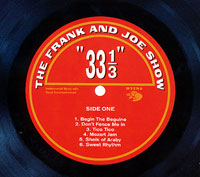 It’s
no coincidence that guitar great Les Paul keeps Frank Vignola
on second guitar right beside him when he performs live every
Monday night at the Iridium. He can play. Kicking off the CD with a
jazzy up tempo bossa nova instrumental cover of “Begin The Beguine”,
Frank and percussionist Joe Ascione proceed to cook up
quite a delectable musical treat with the 13 track 33 1/3. A
few vocalists grace the duo’s mostly instrumental jazz guitar spectacular
including a great Mary Ford-inspired “Don’t Fence Me In”
from Manhattan Transfer’s Janet Siegal to say nothing of
the great Dr. John on his rousing vocal of “Sheik Of Araby”.
A Long Island native, Vignola is simply dazzling on lead, rhythm and
all other guitars and overall, the album is a fine forum for his wide
ranging guitar influences—from Django and Les to Hendrix and Van
Halen. Describing the album concept, producer Joel Dorn adds,
“The title alludes to a time when albums were magnificent two act
plays that had a beginning, a middle and an end”, with Vignola
echoing, “Whether we sell a thousand records or a million, we know
we’ve made the best possible record we were capable of doing at
this point in time and as an artist that’s all you can ask for.”
www.thefrankandjoeshow.com It’s
no coincidence that guitar great Les Paul keeps Frank Vignola
on second guitar right beside him when he performs live every
Monday night at the Iridium. He can play. Kicking off the CD with a
jazzy up tempo bossa nova instrumental cover of “Begin The Beguine”,
Frank and percussionist Joe Ascione proceed to cook up
quite a delectable musical treat with the 13 track 33 1/3. A
few vocalists grace the duo’s mostly instrumental jazz guitar spectacular
including a great Mary Ford-inspired “Don’t Fence Me In”
from Manhattan Transfer’s Janet Siegal to say nothing of
the great Dr. John on his rousing vocal of “Sheik Of Araby”.
A Long Island native, Vignola is simply dazzling on lead, rhythm and
all other guitars and overall, the album is a fine forum for his wide
ranging guitar influences—from Django and Les to Hendrix and Van
Halen. Describing the album concept, producer Joel Dorn adds,
“The title alludes to a time when albums were magnificent two act
plays that had a beginning, a middle and an end”, with Vignola
echoing, “Whether we sell a thousand records or a million, we know
we’ve made the best possible record we were capable of doing at
this point in time and as an artist that’s all you can ask for.”
www.thefrankandjoeshow.com
|
|
| |
THE SUPERTONES
Cinema
Surf
(Golly Gee)
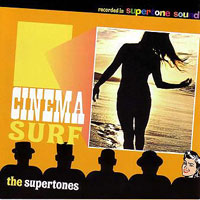 In
2004, The Supertones—Tim Sullivan, Mike Mandina,
Simon Chardiet and Presley Acuna—have recorded their
own unique ‘60s tribute CD entitled Cinema Surf. On it you’ll
find definitive ‘60s instro covers of favorites like “The
Munsters Theme”, “Music To Watch Girls By” and “Star
Trek” played alongside chart-topping U.K. classics like “Wonderful
Land” and “Atlantis”. Also spotlighted here is the ‘Tones
unique ability to reinterpret vocal pop as instrumental fare, most evident
on Cinema Surf covers of “And I Love Her”, “Paint
It Black” and that bastion of paisley-pop, The Lemon Pipers ‘68
classic “Green Tambourine”. Tim Sullivan’s fondness for
big screen spaghetti western madness, ‘60s soundtracks and spy-fi
movies also comes into focus on new Supertones renditions of “The
Magnificent Seven”, “Never On Sunday” and “Our Man
Flint”. With so much nostalgia and musical history in play, ‘60s
aficionados and guitar instro fans alike will dig Cinema Surf. Coinciding
with the the 2004 CD release of Cinema Surf, California-based
Golly Gee Records have also issued a fine Supertones companion CD entitled
Original Music 1989-2003. www.gollygeerecords.com In
2004, The Supertones—Tim Sullivan, Mike Mandina,
Simon Chardiet and Presley Acuna—have recorded their
own unique ‘60s tribute CD entitled Cinema Surf. On it you’ll
find definitive ‘60s instro covers of favorites like “The
Munsters Theme”, “Music To Watch Girls By” and “Star
Trek” played alongside chart-topping U.K. classics like “Wonderful
Land” and “Atlantis”. Also spotlighted here is the ‘Tones
unique ability to reinterpret vocal pop as instrumental fare, most evident
on Cinema Surf covers of “And I Love Her”, “Paint
It Black” and that bastion of paisley-pop, The Lemon Pipers ‘68
classic “Green Tambourine”. Tim Sullivan’s fondness for
big screen spaghetti western madness, ‘60s soundtracks and spy-fi
movies also comes into focus on new Supertones renditions of “The
Magnificent Seven”, “Never On Sunday” and “Our Man
Flint”. With so much nostalgia and musical history in play, ‘60s
aficionados and guitar instro fans alike will dig Cinema Surf. Coinciding
with the the 2004 CD release of Cinema Surf, California-based
Golly Gee Records have also issued a fine Supertones companion CD entitled
Original Music 1989-2003. www.gollygeerecords.com
|
|
| |
BILL
FRISELL
Unspeakable
(Nonesuch)
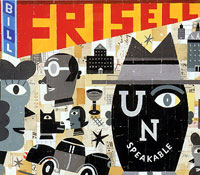 On
his 2004 CD for Nonesuch, Unspeakable, guitarist Bill
Frisell adopts a groove and soul based jazz mode. Backed up by Tony
Scherr (bass), Kenny Wollesen (drums), Steven Bernstein
(horn arrangements) and others, Frisell and legendary producer Hal
Willner pepper the Unspeakable tracks with kooky orchestral
/ soundtrack sounds taken from vintage vinyl records—mostly sampled
ideas or moods scoured from NBC’s well-stocked record library.
According to the guitarist, “Making this record with Hal was the
fulfillment of a 20-plus year dream for me”, with Willner echoing,
“We wanted to make a beautiful, fun record that still was a Bill
Frisell record. I think we succeeded.” Willner gave Frisell his
first recording opportunity back in 1981 on a multi-artist tribute to
Nino Rota, and various session work—the 1988 Disney music tribute
(Stay Awake) and a 1992 tribute to Charles Mingus entitled Weird
Nightmare—has seasoned them well for the roomy, mood enhancing
sound of Unspeakable. www.nonesuch.com On
his 2004 CD for Nonesuch, Unspeakable, guitarist Bill
Frisell adopts a groove and soul based jazz mode. Backed up by Tony
Scherr (bass), Kenny Wollesen (drums), Steven Bernstein
(horn arrangements) and others, Frisell and legendary producer Hal
Willner pepper the Unspeakable tracks with kooky orchestral
/ soundtrack sounds taken from vintage vinyl records—mostly sampled
ideas or moods scoured from NBC’s well-stocked record library.
According to the guitarist, “Making this record with Hal was the
fulfillment of a 20-plus year dream for me”, with Willner echoing,
“We wanted to make a beautiful, fun record that still was a Bill
Frisell record. I think we succeeded.” Willner gave Frisell his
first recording opportunity back in 1981 on a multi-artist tribute to
Nino Rota, and various session work—the 1988 Disney music tribute
(Stay Awake) and a 1992 tribute to Charles Mingus entitled Weird
Nightmare—has seasoned them well for the roomy, mood enhancing
sound of Unspeakable. www.nonesuch.com
|
|
| |
THE
RICHARD LEO JOHNSON TRIO
Poetry
Of Appliance
(Cuneiform)
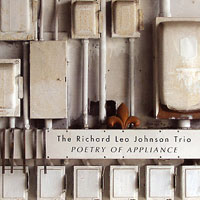 It
sounds like a perfect fit. Avant gard folk-jazz guitarist Richard Leo
Johnson forms new minimalist classical folk-Americana music trio with
a CD release on Cuneiform Records—among the most adventurous
modern music labels in the U.S. In recent years, Johnson released a
couple CDs on Blue Note and his 2004 Cuneiform release, Poetry Of
Appliance furthers his reputation as the modern heir to the greatest
acoustic guitar instrumentalists such as late greats John Fahey and
Michael Hedges. Johnson grew up on classic progressive instrumental
guitar heroes like John McLaughlin and Leo Kottke and he strikes gold
on his own on another album of adventurous instrumentals, assisted here
by Ricardo Ochoa (electric violin) and Andrew Ripley (keyboards).
Part of what sets Johnson apart is his sheer technique and audacious
approach to acoustic music, which he structures more like electric chamber
music than either bluegrass or jazz could ever imagine. Performing on
acoustic 12 string, acoustic double neck 6 and 12 string and electric
6 string, Johnson’s ethereal acoustic/electric forays are greatly
enhanced by some quirky keyboard electronica courtesy of Andrew Ripley
and strategic theremin injections by Ochoa. Challenging the instrumental
acoustic genre, Richard Leo Johnson takes the guitar into a brave new
world. www.rlj3.com
/ www.cuneiformrecords.com It
sounds like a perfect fit. Avant gard folk-jazz guitarist Richard Leo
Johnson forms new minimalist classical folk-Americana music trio with
a CD release on Cuneiform Records—among the most adventurous
modern music labels in the U.S. In recent years, Johnson released a
couple CDs on Blue Note and his 2004 Cuneiform release, Poetry Of
Appliance furthers his reputation as the modern heir to the greatest
acoustic guitar instrumentalists such as late greats John Fahey and
Michael Hedges. Johnson grew up on classic progressive instrumental
guitar heroes like John McLaughlin and Leo Kottke and he strikes gold
on his own on another album of adventurous instrumentals, assisted here
by Ricardo Ochoa (electric violin) and Andrew Ripley (keyboards).
Part of what sets Johnson apart is his sheer technique and audacious
approach to acoustic music, which he structures more like electric chamber
music than either bluegrass or jazz could ever imagine. Performing on
acoustic 12 string, acoustic double neck 6 and 12 string and electric
6 string, Johnson’s ethereal acoustic/electric forays are greatly
enhanced by some quirky keyboard electronica courtesy of Andrew Ripley
and strategic theremin injections by Ochoa. Challenging the instrumental
acoustic genre, Richard Leo Johnson takes the guitar into a brave new
world. www.rlj3.com
/ www.cuneiformrecords.com
Attention Artists and Record Companies: Have your CD reviewed
in mwe3.com and 20th Century Guitar. Send to P.O. Box 630249, Little
Neck, N.Y. 11363-0249
Contact: rss54@mwe3.com



|
|
| |
|
|
| |
Attention
Artists and Record Companies: Have your CD reviewed by mwe3.com. Send to:
MWE3.com CD Reviews Editor Robert Silverstein,
P.O. Box 630249, Little Neck, N.Y. 11363-0249
|
|
|
|











 Acoustic
guitar legend Leo Kottke released Try And Stop Me in 2004 as
the follow up CD to his 2002 release with Mike Gordon of Phish entitled
Clone. While Clone featured a range of vocal tracks, Try
And Stop Me gets Kottke back to doing what he does best which is
making hypnotic, rural guitar instrumentals that evoke the spirits of
his mentor John Fahey. Recorded near Kottke’s home in Minneapolis,
the 11 track CD finds Kottke riffing out a six and 12 string guitar
adding in more than a touch of improvisation. Kottke adds, “Over
time, the importance of improvisation for me has increased”, adding
“Clone raised the level of risk I was willing to accept.”
Kottke’s strength as a guitar instrumentalist over the years was
always his unique ability to blend folk, pop, jazz and classical guitar
styles as his own and in typical fashion, Kottke rounds out Try And
Stop Me with an instrumental version of the Patti Page ‘50s
pop standard “Mockingbird Hill.” The CD’s lone vocal
finds Kottke reinterpreting a folk classic with Kottke adding, “It
was folk singing legend Pete Seeger’s recording of ‘The Banks
Of Marble’ that first got me excited about the 12-string guitar
many years ago.” Over the years, Kottke has earned the respect
of guitar contemporaries such as John Fahey, Paco de Lucia, John Williams
and Joe Pass to which the guitarist adds, “My music is maybe hard
to categorize. It doesn’t fit conveniently into the bins at record
stores. I don’t rise and fall with trends. It’s been great
that way.” While classic Kottke albums—from Chewing Pine
in 1975 to his 1999 album One Guitar, No Vocals—are considered
classics, his 1969 breakthrough album on Takoma Records, Six And
12 String Guitar is also highly regarded. Long time Kottke watchers
will want to check out a 2004 hybrid stereo / SACD version of the album
on Takoma / Fantasy.
Acoustic
guitar legend Leo Kottke released Try And Stop Me in 2004 as
the follow up CD to his 2002 release with Mike Gordon of Phish entitled
Clone. While Clone featured a range of vocal tracks, Try
And Stop Me gets Kottke back to doing what he does best which is
making hypnotic, rural guitar instrumentals that evoke the spirits of
his mentor John Fahey. Recorded near Kottke’s home in Minneapolis,
the 11 track CD finds Kottke riffing out a six and 12 string guitar
adding in more than a touch of improvisation. Kottke adds, “Over
time, the importance of improvisation for me has increased”, adding
“Clone raised the level of risk I was willing to accept.”
Kottke’s strength as a guitar instrumentalist over the years was
always his unique ability to blend folk, pop, jazz and classical guitar
styles as his own and in typical fashion, Kottke rounds out Try And
Stop Me with an instrumental version of the Patti Page ‘50s
pop standard “Mockingbird Hill.” The CD’s lone vocal
finds Kottke reinterpreting a folk classic with Kottke adding, “It
was folk singing legend Pete Seeger’s recording of ‘The Banks
Of Marble’ that first got me excited about the 12-string guitar
many years ago.” Over the years, Kottke has earned the respect
of guitar contemporaries such as John Fahey, Paco de Lucia, John Williams
and Joe Pass to which the guitarist adds, “My music is maybe hard
to categorize. It doesn’t fit conveniently into the bins at record
stores. I don’t rise and fall with trends. It’s been great
that way.” While classic Kottke albums—from Chewing Pine
in 1975 to his 1999 album One Guitar, No Vocals—are considered
classics, his 1969 breakthrough album on Takoma Records, Six And
12 String Guitar is also highly regarded. Long time Kottke watchers
will want to check out a 2004 hybrid stereo / SACD version of the album
on Takoma / Fantasy.  A
band long considered by aficionados as the American equivalent of progressive
U.K. trendsetters like Gentle Giant or Camel, Happy The Man sadly broke
up in 1979 after two successful albums on Arista Records. 20 years after
their breakup, HTM co-founders Stanley Whitaker (guitars) and
Frank Wyatt (sax, woodwinds) began sewing the seeds for a reunion
of the band and the fruits of their efforts finally appears on the 2004
Inside Out Music CD release of The Muse Awakens. Despite
the various reasons to celebrate this first Happy The Man studio album
in ages, the one problem here is the non-appearance of HTM mentor Kit
Watkins, who unfortunately opted out of the comeback album in lieu
of the band’s decision to tour. One of the most gifted keyboardist
/ composers of the ‘70s and ‘80s, Watkins is sorely missed
by long time progressive rock fans. Yet taken on it’s own, The
Muse Awakens is quite a noble effort in it’s own right. Featuring
Whitaker and Wyatt in fine form alongside keyboardist and long time
HTM devotee David Rosenthal, Rick Kennell (bass) and drumming
ace (and fine recording artist in his own right)Joe Bergamini,
The Muse Awakens draws from the adventurous prog-rock spirit
of the original Happy The Man sound while taking advantage of the advances
in recording studio technology. In the words of Frank Wyatt, “Just
sitting in the room playing with Stan again, I felt like a kid again.
I felt like we were right there where we left off. It just literally
poured right out of us. This music sort of writes itself.” Anyone
familiar with those classic HTM albums, the many fine Kit Watkins instrumental
albums or the progressive jazz and rock sounds coming from the Inside
Out label these past few years will thoroughly enjoy the amazing sounds
on The Muse Awakens.
A
band long considered by aficionados as the American equivalent of progressive
U.K. trendsetters like Gentle Giant or Camel, Happy The Man sadly broke
up in 1979 after two successful albums on Arista Records. 20 years after
their breakup, HTM co-founders Stanley Whitaker (guitars) and
Frank Wyatt (sax, woodwinds) began sewing the seeds for a reunion
of the band and the fruits of their efforts finally appears on the 2004
Inside Out Music CD release of The Muse Awakens. Despite
the various reasons to celebrate this first Happy The Man studio album
in ages, the one problem here is the non-appearance of HTM mentor Kit
Watkins, who unfortunately opted out of the comeback album in lieu
of the band’s decision to tour. One of the most gifted keyboardist
/ composers of the ‘70s and ‘80s, Watkins is sorely missed
by long time progressive rock fans. Yet taken on it’s own, The
Muse Awakens is quite a noble effort in it’s own right. Featuring
Whitaker and Wyatt in fine form alongside keyboardist and long time
HTM devotee David Rosenthal, Rick Kennell (bass) and drumming
ace (and fine recording artist in his own right)Joe Bergamini,
The Muse Awakens draws from the adventurous prog-rock spirit
of the original Happy The Man sound while taking advantage of the advances
in recording studio technology. In the words of Frank Wyatt, “Just
sitting in the room playing with Stan again, I felt like a kid again.
I felt like we were right there where we left off. It just literally
poured right out of us. This music sort of writes itself.” Anyone
familiar with those classic HTM albums, the many fine Kit Watkins instrumental
albums or the progressive jazz and rock sounds coming from the Inside
Out label these past few years will thoroughly enjoy the amazing sounds
on The Muse Awakens.  It’s
no coincidence that guitar great Les Paul keeps Frank Vignola
on second guitar right beside him when he performs live every
Monday night at the Iridium. He can play. Kicking off the CD with a
jazzy up tempo bossa nova instrumental cover of “Begin The Beguine”,
Frank and percussionist Joe Ascione proceed to cook up
quite a delectable musical treat with the 13 track 33 1/3. A
few vocalists grace the duo’s mostly instrumental jazz guitar spectacular
including a great Mary Ford-inspired “Don’t Fence Me In”
from Manhattan Transfer’s Janet Siegal to say nothing of
the great Dr. John on his rousing vocal of “Sheik Of Araby”.
A Long Island native, Vignola is simply dazzling on lead, rhythm and
all other guitars and overall, the album is a fine forum for his wide
ranging guitar influences—from Django and Les to Hendrix and Van
Halen. Describing the album concept, producer Joel Dorn adds,
“The title alludes to a time when albums were magnificent two act
plays that had a beginning, a middle and an end”, with Vignola
echoing, “Whether we sell a thousand records or a million, we know
we’ve made the best possible record we were capable of doing at
this point in time and as an artist that’s all you can ask for.”
It’s
no coincidence that guitar great Les Paul keeps Frank Vignola
on second guitar right beside him when he performs live every
Monday night at the Iridium. He can play. Kicking off the CD with a
jazzy up tempo bossa nova instrumental cover of “Begin The Beguine”,
Frank and percussionist Joe Ascione proceed to cook up
quite a delectable musical treat with the 13 track 33 1/3. A
few vocalists grace the duo’s mostly instrumental jazz guitar spectacular
including a great Mary Ford-inspired “Don’t Fence Me In”
from Manhattan Transfer’s Janet Siegal to say nothing of
the great Dr. John on his rousing vocal of “Sheik Of Araby”.
A Long Island native, Vignola is simply dazzling on lead, rhythm and
all other guitars and overall, the album is a fine forum for his wide
ranging guitar influences—from Django and Les to Hendrix and Van
Halen. Describing the album concept, producer Joel Dorn adds,
“The title alludes to a time when albums were magnificent two act
plays that had a beginning, a middle and an end”, with Vignola
echoing, “Whether we sell a thousand records or a million, we know
we’ve made the best possible record we were capable of doing at
this point in time and as an artist that’s all you can ask for.”
 In
2004, The Supertones—Tim Sullivan, Mike Mandina,
Simon Chardiet and Presley Acuna—have recorded their
own unique ‘60s tribute CD entitled Cinema Surf. On it you’ll
find definitive ‘60s instro covers of favorites like “The
Munsters Theme”, “Music To Watch Girls By” and “Star
Trek” played alongside chart-topping U.K. classics like “Wonderful
Land” and “Atlantis”. Also spotlighted here is the ‘Tones
unique ability to reinterpret vocal pop as instrumental fare, most evident
on Cinema Surf covers of “And I Love Her”, “Paint
It Black” and that bastion of paisley-pop, The Lemon Pipers ‘68
classic “Green Tambourine”. Tim Sullivan’s fondness for
big screen spaghetti western madness, ‘60s soundtracks and spy-fi
movies also comes into focus on new Supertones renditions of “The
Magnificent Seven”, “Never On Sunday” and “Our Man
Flint”. With so much nostalgia and musical history in play, ‘60s
aficionados and guitar instro fans alike will dig Cinema Surf. Coinciding
with the the 2004 CD release of Cinema Surf, California-based
Golly Gee Records have also issued a fine Supertones companion CD entitled
Original Music 1989-2003.
In
2004, The Supertones—Tim Sullivan, Mike Mandina,
Simon Chardiet and Presley Acuna—have recorded their
own unique ‘60s tribute CD entitled Cinema Surf. On it you’ll
find definitive ‘60s instro covers of favorites like “The
Munsters Theme”, “Music To Watch Girls By” and “Star
Trek” played alongside chart-topping U.K. classics like “Wonderful
Land” and “Atlantis”. Also spotlighted here is the ‘Tones
unique ability to reinterpret vocal pop as instrumental fare, most evident
on Cinema Surf covers of “And I Love Her”, “Paint
It Black” and that bastion of paisley-pop, The Lemon Pipers ‘68
classic “Green Tambourine”. Tim Sullivan’s fondness for
big screen spaghetti western madness, ‘60s soundtracks and spy-fi
movies also comes into focus on new Supertones renditions of “The
Magnificent Seven”, “Never On Sunday” and “Our Man
Flint”. With so much nostalgia and musical history in play, ‘60s
aficionados and guitar instro fans alike will dig Cinema Surf. Coinciding
with the the 2004 CD release of Cinema Surf, California-based
Golly Gee Records have also issued a fine Supertones companion CD entitled
Original Music 1989-2003.  On
his 2004 CD for Nonesuch, Unspeakable, guitarist Bill
Frisell adopts a groove and soul based jazz mode. Backed up by Tony
Scherr (bass), Kenny Wollesen (drums), Steven Bernstein
(horn arrangements) and others, Frisell and legendary producer Hal
Willner pepper the Unspeakable tracks with kooky orchestral
/ soundtrack sounds taken from vintage vinyl records—mostly sampled
ideas or moods scoured from NBC’s well-stocked record library.
According to the guitarist, “Making this record with Hal was the
fulfillment of a 20-plus year dream for me”, with Willner echoing,
“We wanted to make a beautiful, fun record that still was a Bill
Frisell record. I think we succeeded.” Willner gave Frisell his
first recording opportunity back in 1981 on a multi-artist tribute to
Nino Rota, and various session work—the 1988 Disney music tribute
(Stay Awake) and a 1992 tribute to Charles Mingus entitled Weird
Nightmare—has seasoned them well for the roomy, mood enhancing
sound of Unspeakable.
On
his 2004 CD for Nonesuch, Unspeakable, guitarist Bill
Frisell adopts a groove and soul based jazz mode. Backed up by Tony
Scherr (bass), Kenny Wollesen (drums), Steven Bernstein
(horn arrangements) and others, Frisell and legendary producer Hal
Willner pepper the Unspeakable tracks with kooky orchestral
/ soundtrack sounds taken from vintage vinyl records—mostly sampled
ideas or moods scoured from NBC’s well-stocked record library.
According to the guitarist, “Making this record with Hal was the
fulfillment of a 20-plus year dream for me”, with Willner echoing,
“We wanted to make a beautiful, fun record that still was a Bill
Frisell record. I think we succeeded.” Willner gave Frisell his
first recording opportunity back in 1981 on a multi-artist tribute to
Nino Rota, and various session work—the 1988 Disney music tribute
(Stay Awake) and a 1992 tribute to Charles Mingus entitled Weird
Nightmare—has seasoned them well for the roomy, mood enhancing
sound of Unspeakable.  It
sounds like a perfect fit. Avant gard folk-jazz guitarist Richard Leo
Johnson forms new minimalist classical folk-Americana music trio with
a CD release on Cuneiform Records—among the most adventurous
modern music labels in the U.S. In recent years, Johnson released a
couple CDs on Blue Note and his 2004 Cuneiform release, Poetry Of
Appliance furthers his reputation as the modern heir to the greatest
acoustic guitar instrumentalists such as late greats John Fahey and
Michael Hedges. Johnson grew up on classic progressive instrumental
guitar heroes like John McLaughlin and Leo Kottke and he strikes gold
on his own on another album of adventurous instrumentals, assisted here
by Ricardo Ochoa (electric violin) and Andrew Ripley (keyboards).
Part of what sets Johnson apart is his sheer technique and audacious
approach to acoustic music, which he structures more like electric chamber
music than either bluegrass or jazz could ever imagine. Performing on
acoustic 12 string, acoustic double neck 6 and 12 string and electric
6 string, Johnson’s ethereal acoustic/electric forays are greatly
enhanced by some quirky keyboard electronica courtesy of Andrew Ripley
and strategic theremin injections by Ochoa. Challenging the instrumental
acoustic genre, Richard Leo Johnson takes the guitar into a brave new
world.
It
sounds like a perfect fit. Avant gard folk-jazz guitarist Richard Leo
Johnson forms new minimalist classical folk-Americana music trio with
a CD release on Cuneiform Records—among the most adventurous
modern music labels in the U.S. In recent years, Johnson released a
couple CDs on Blue Note and his 2004 Cuneiform release, Poetry Of
Appliance furthers his reputation as the modern heir to the greatest
acoustic guitar instrumentalists such as late greats John Fahey and
Michael Hedges. Johnson grew up on classic progressive instrumental
guitar heroes like John McLaughlin and Leo Kottke and he strikes gold
on his own on another album of adventurous instrumentals, assisted here
by Ricardo Ochoa (electric violin) and Andrew Ripley (keyboards).
Part of what sets Johnson apart is his sheer technique and audacious
approach to acoustic music, which he structures more like electric chamber
music than either bluegrass or jazz could ever imagine. Performing on
acoustic 12 string, acoustic double neck 6 and 12 string and electric
6 string, Johnson’s ethereal acoustic/electric forays are greatly
enhanced by some quirky keyboard electronica courtesy of Andrew Ripley
and strategic theremin injections by Ochoa. Challenging the instrumental
acoustic genre, Richard Leo Johnson takes the guitar into a brave new
world. 

